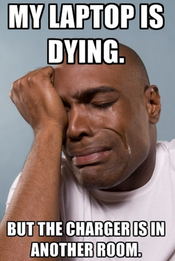Future Now
The IFTF Blog
#FirstWorldProblems

First World Problems are Third World Problems are First World Problems, and Second World Problems too!
It’s time to accept something.
#FirstWorldProblems are dead.
Used to describe a complaint that is thought to be trivial in nature, First World Problems makes one thing clear: those of is living here in the “first world” are wealthy and challenged with small issues, while those other people living over there in the “third world” are in a state of constant survival. Only those of us living in the “first world” can be frustrated by forgetting to plug in a charger, looking weird in a virtual reality headset, or some Twitter basics.
Put Apple Watch on charger... Didn't plug charger in.... ???? #firstworldproblems
— Jenn (@LandinosMah) May 31, 2016
In the future VR face will become a real issue. #VRface #firstworldproblems pic.twitter.com/N69a3rR7Oi
— Sean Hinz (@SeanHinz) June 9, 2016
When there's a spelling error in your last tweet but you can't delete it because someone already RT or liked it.. #firstworldproblems
— Austin McGuire - (@imaustinmcguire) May 31, 2016
The narrative behind First World Problems supports a mythology that is woefully incorrect and dangerous. The mythology goes like this:
Poverty exists in a different part of the world where everyone is poor. And over here, well, everything is pretty much fine in comparison.
And as a result, we perceive entire nations and continents as being damaged, wholly damaged, and in need of foreign intervention. And this is where we commit our biggest error; before we even begin a human centered design program focused on social good, for example, we’ve already reinforced patronizing power dynamics that consistently put poorer nations at a disadvantage. We exoticise and romanticize poverty over there and become blind to poverty right here.
The reality of the 21st century is that there is exceptional wealth and fast flowing money everywhere in the world. And poverty can be found in every country. It’s been well researched that inequality between countries is dropping, while inequality within countries is on the rise. In other words, poverty is in our backyard, and wealth is just around the corner. There simply is no such thing as a #FirstWorldProblem anymore.
The origin of the term is even more telling. First World, Third World, and yes, even Second World were political designations used during the Cold War. The First World was the US, Western Europe, and aligned nations. The Second World was China, the Soviet Union, Cuba, and aligned nations. While the Third World were all the countries that remained non-aligned with NATO or the Communist Bloc, and as a result suffered from proxy wars and political and economic coercions and eventual desertion when the Soviet Union fell. Along with that history, let’s put #FirstWorldProblems to bed and rise to the challenges of the 21st century by making use of our increasingly global knowledge. Let’s speak with nuance and say what we actual mean.
I think it might be time to come up with a new hashtag in lieu of the now outdated #FirstWorldProblems
What about:
#TrivialTimes
#SmallProblems
#IShouldHaveBetterThingsToComplainAbout
#TechnologyIsHard
(this isn’t my strong suite, so help me out and suggest some actually good ones!)



